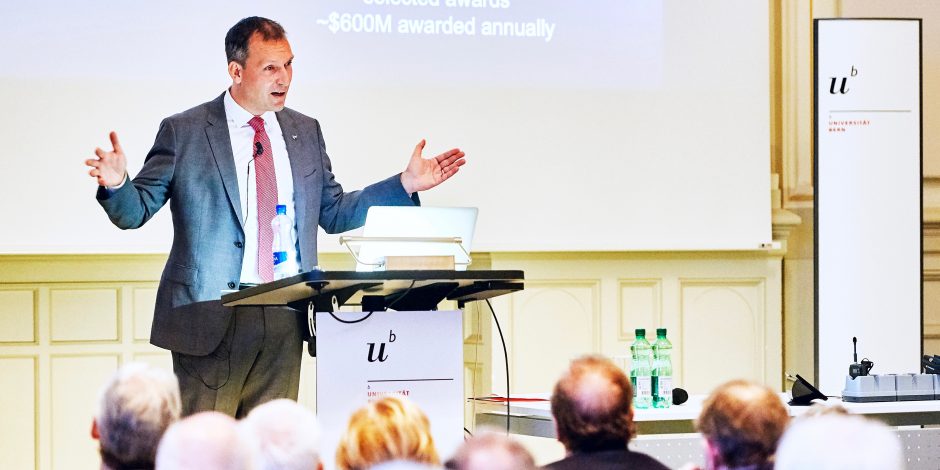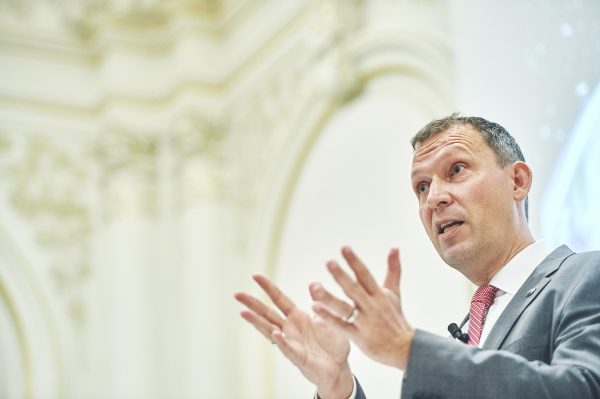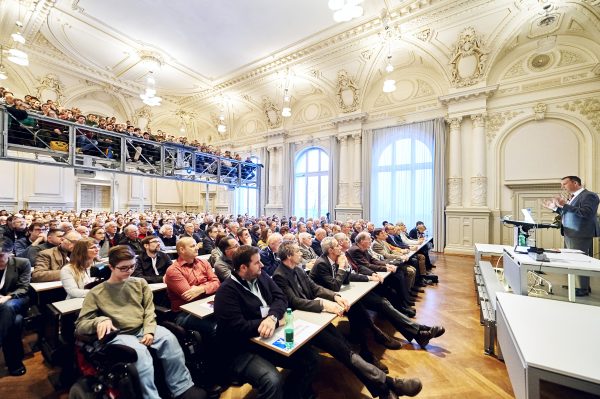«Basic research is incredibly important»

As NASA’s new science director, Thomas Zurbuchen announced the discovery of seven Earth-sized planets around the nearby star TRAPPIST-1 at a live-streamed press conference that was followed worldwide at the end of February. A month earlier, the Swiss born physicist had visited the University of Bern where he had studied and gained his PhD. «I loved reconnecting with friends and also making new ones. It is always great to go back to one’s academic home,» he summarized.

NASA science director Thomas Zurbuchen during his lecture at the University of Bern. © UniBe/Manu Friedrich.
«Great audience, even the mayor from my mountain village showed up for it!» Thomas Zurbuchen twittered after his talk at the University of Bern. Heiligenschwendi, a village at 1100 m altitude near Thun in the canton of Bern, is the place where the Associate Administrator for the Science Mission Directorate of NASA grew up. He was the first in his family to tackle a university degree. The highest NASA scientist credits Switzerland’s successful school system with the fact that a child from a mountain village interested in science was able to gain a PhD in physics and carve out such a good career. “Switzerland should be proud of it,” he said, “And the University of Bern gave me a lot too.” During the talk at his Alma Mater, he praised the educational lectures, but also appreciated that he was sent elsewhere to summer schools and had a budget of 50,000 Swiss francs for measuring instruments even back as a degree candidate.
Today, NASA’s 49-year old science director is in charge of an annual budget of five billion Dollars and distributes research funds to 10,000 scientists. Protecting and improving life on earth, searching for life elsewhere and expanding our knowledge: These are NASA’s key scientific themes, reaching from weather forecasting and helping to bring forest fires under control to providing confirmation of Einstein’s general theory of relativity. «Basic research is incredibly important,» stated Zurbuchen and emphasized that he presented this message not only to an academic audience but also to politicians. Among his top science priority is answering the question «are we alone». With the detection of the TRAPPIST-1 system, he is convinced that a remarkable step forward towards answering that question was made. «The discovery gives us a hint that finding a second Earth is not just a matter of if…but when,» he said at the press conference at NASA Headquaters in Washington.

Great public interest: The auditorium was full for Thomas Zurbuchen’s lecture. © UniBe/Manu Friederich
Top marks for calibration laboratory in Bern
In Bern, Zurbuchen loved reconnecting with friends and also making new ones. «I met Claude Nicollier, a true Swiss space pioneer,» he recalls: «And I also met former collaborators and friends I used to have coffee with every day over 20 years ago.» During a visit of the MEFISTO laboratory at the University of Bern he even came across an instrument he knew very well because he was involved in its development that stretched over many years. The physicist watched as the US instrument was calibrated in the measuring chamber. It will investigate the heavy, charged particles in the solar wind on-board a European satellite, the Solar Orbiter of the ESA. Zurbuchen explained how the laboratory at the University of Bern is the best in the world in this calibration field, because experts ensure continual, thorough maintenance of the infrastructure. «These are engineers who know what’s going on,» said the NASA science director appreciatively: «From the beginning of space age, Switzerland has been a significant player in space research. The excellent results of Rosina as part of ESA’s Rosetta mission are the latest part of that.»
Podcast of Prof. Thomas Zurbuchen’s lecture at the University of Bern
Categories: External Newsletter
